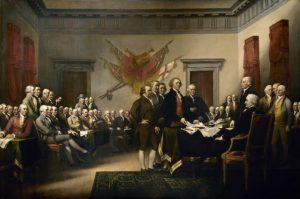 Liberal hysteria over Donald Trump was hardly required to pose questions about the “patriotic myths” of the Founding Fathers, but his elevation to the Oval Office has accelerated the trashing of the heroic past, even the stories of the American Revolution that generations of school children cherished.
Liberal hysteria over Donald Trump was hardly required to pose questions about the “patriotic myths” of the Founding Fathers, but his elevation to the Oval Office has accelerated the trashing of the heroic past, even the stories of the American Revolution that generations of school children cherished.
It’s not just Parson Weems’ imaginative tale of George Washington cutting down his father’s cherished cherry tree, and his owning up with his assertion that “I cannot tell a lie.” That story, from the first biography of the first president, has long been exposed as the fiction of a teaching moment meant to encourage childhood virtue. The current fashion of debunking authentic stories of the Founding Fathers provides different lessons, piercing the pride of country and the questioning of the morality of our origins.
The American Revolution is targeted as “the last bulwark of national myth,” or, as Adam Gopnik of The New Yorker characterizes it with a snort of snark, something “still sacred in its self-directed propaganda.” He speculates wistfully in the column headline that “We Could All Have Been Canadians” and says that such a result would have been a more sanguine alternative to idealizing what our Founding Fathers actually wrought. He is only half (or perhaps a quarter) in jest trying to be provocative.
He writes, “The Declaration of Independence, the American Revolution, the creation of the United States of America — what if all this was a terrible idea, and what if the injustices and madness of American life since then have occurred not in spite of the virtues of the Founding Fathers but because of them?”
Reading a range of new academic histories drew him into his absurd cause-and-effect analysis of the American Revolution. Instead of the democratic principles conceived by thoughtful and pragmatic idealists, these arguments find that the founders concocted their schemes and dreams through mixing the rhetoric of slaveholders with Enlightenment argle-bargle, “producing a country that was always marked for violence and disruption and demagogy.” The American Revolution is thus the last major myth standing.
Deconstructed and gone from textbooks is the portrait of the brave, if flawed, Christopher Columbus, who sought a shorter route to India and stumbled into a new world instead. In the new telling, he is a rapacious warrior who led to the genocide of American Indians, as he called them. And so, Columbus Day must be erased from the books.
Deconstructed and gone from memory are the rugged pioneers who set out to settle the new and untamed land, hoping to arrive in the West with their scalps intact. They’re replaced by greedy and unscrupulous men who stole the land of the noble red men and deserved their savage haircut.
Deconstructed and gone with the wind are the heroes of the South, who sacrificed their blood and treasure in defense of kith and kin, as they saw it, trapped in the compromises made over the slavery that was the shame of all, Southern slaveholder and New England slave importer alike. Pulling down of the statue of Robert E. Lee in New Orleans, as graphic as the toppling of the evil Saddam Hussein’s statue in Baghdad in 2003, was a cruel reminder that not even a noble man on the wrong side can be spared by the politically correct mob.
The academic deconstruction of American history has spared the Revolution until now because, in The New Yorker account, “fetishizing” a Founding Father can be worth a Pulitzer Prize, as in the success of “Hamilton,” the hip-hop musical by Lin-Manuel Miranda. But that’s changing; historians are nibbling away at conventional interpretations of the American experience, fanning the fires of contemporary polemics and questioning the democratic roots of pride in country.
Gopnik, who was born in Philadelphia and raised in Montreal, betrays an emotional sympathy for the Canadian sensibility, which encourages him to denigrate American heroics and sacrifice. As a child, he writes, he learned that Americans hid behind trees to fight the redcoats — as if that betrayed cowardice. He denigrates American heroism on D-Day and the carnage on Omaha Beach, compared with the Canadians who fought well at the more lightly defended Juno Beach. It’s a silly comparison, as men of both nations who fought there would have been the first to say.
Gopnik knows that his audience of millennials is hardly the “greatest generation,” like the men and women who won World War II. He recalls parades in Philadelphia with flags and the singing of “The Marines’ Hymn”; and that Canadian patriotic pageantry was celebrated in a hockey anthem sung when the Canadian hockey team beat the Russians in 1972. Could a young man resist that contrast? Apparently not. That’s what comes from a bad rewrite of history.
COPYRIGHT 2017 CREATORS.COM
 Suzanne Fields is currently working on a book that will revisit John Milton’s “Paradise Lost.” You may write to her at suzannefields2000@gmail.com.
Suzanne Fields is currently working on a book that will revisit John Milton’s “Paradise Lost.” You may write to her at suzannefields2000@gmail.com.
The views expressed in opinion articles are solely those of the author and are not necessarily either shared or endorsed by Black Community News.
 CURE News and Clergy Blog News and Commentary for Christians
CURE News and Clergy Blog News and Commentary for Christians




All we can do is keep spreading the truth!